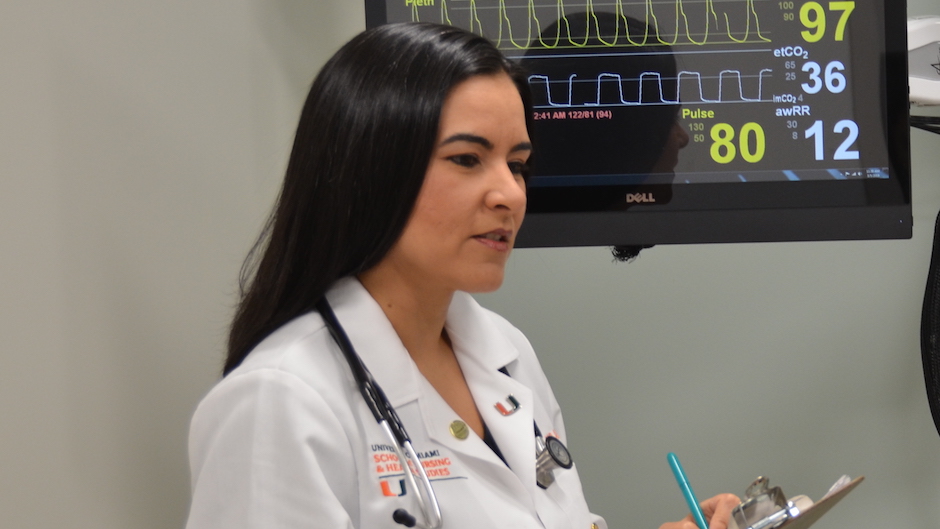“Career high” is more than just a turn of phrase for nurse practitioner Michelle Arrojo, DNP ’18, APRN, FNP-BC, ENP-C, whose former office was 30,000 feet in the air. In 2016, several years after retiring her wings, she became a nursing specialist at S.H.A.R.E.™ (Simulation Hospital Advancing Research and Education). Two years later, she earned her Doctor of Nursing Practice degree at the University of Miami, distinguishing herself with the Excellence in Academics and Clinical Performance Award. Findings from Dr. Arrojo’s DNP scholarly project, “Health Care Improvement Depression Screening in the Pediatric Emergency Department and Linking Patients to Early Diagnosis and Early Intervention,” were recently published in the journal Pediatric Nursing. “Starting out, I viewed nursing as a secure job that would always be in demand,” she says. “It has evolved into so much more for me.”
Tell us a little about your background.
I was born and raised in Miami as a first generation Cuban-American. I am the only person in my family to obtain a bachelor’s, master’s, or doctorate degree. I have realized that as a caregiver, there’s always room to learn more and expand on my ability to help a broader patient base. For example, I’ve started the post-master’s certificate in psychiatric mental health nursing at SONHS.
What’s something most people don’t know about you?
Although I don’t get to play as much as I’d like, I’m a classically trained pianist and graduated from the American College of Musicians; I have always really enjoyed it and appreciated the artistry.
What are some memorable jobs you had before S.H.A.R.E.™?
Over the course of my 20-plus-year career I’ve had the opportunity to work in ICUs, NICUs, and interventional radiology; all have had their memorable moments, but the one that gets the most curiosity from colleagues and friends was the three years I spent as an RN on a pediatric critical care transport team. The unique experience of flying anywhere we were needed, including foreign countries, is certainly the most unique role I have filled.
Why did you become a nurse educator?
As a veteran nurse in the ICU, precepting new nurses was one of my favorite duties. It’s supremely rewarding to positively influence the next generation of advanced practice nurses. The gratitude students express, the satisfaction of watching them learn and grow during simulation, has been an unexpected gift. I will always look to add to my foundational knowledge in an effort to help develop future practitioners.
What is your teaching philosophy?
Teach with kindness and respect. Make sure the students understand that there are no dumb questions. With small class sizes, we have an opportunity to really hear them out and customize their learning experience as best we can.
What is the best part of your work?
One of the most satisfying aspects of my job is drawing on my real-world experiences to invent clinical scenarios for students to work through in simulation. Simulation is such a unique and intimate setting for learning that oftentimes students are a bit intimidated at first. By bringing small groups together to encourage discussion and collaboration, my nurse specialist partner-in-crime, Dr. Amauri Quintana, and I get to watch them evolve into more confident and well-rounded practitioners. I also like teaching Health Assessment lab for the clinical graduate programs, which builds a bridge from lecture to practice.
How do you manage work-life balance?
When I have time off, I especially enjoy spending it outside, exploring our beaches and parks with my kids, Lukas and Layla, who are 10 and 6, respectively. I make sure to get in a daily workout with my husband too. During the pandemic, we built out our little home gym, and it has been a pleasure to share our love of fitness with our kids.

